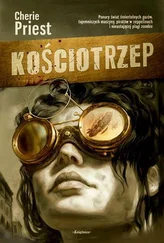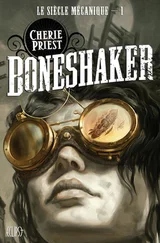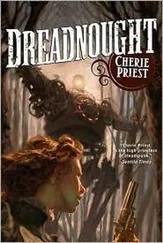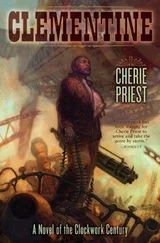She hesitated, and said, “They said they’re officers, but … but I don’t think I believe them, sir. Something’s not right about them, and why would they want to arrest Dr. Wellers?”
“They don’t,” he said. He clenched his jaw so tight that his cheeks looked hollow. “They want to kill me.”
Her eyes widened. She looked to Lincoln for a denial, rebuttal, or explanation, but none was forthcoming. Gently, he told her, “You’ve done very well, Polly. Don’t worry about Dr. Wellers. I’ll see to these men momentarily. Wellers? Please help me into my chair. I founded that force, and it will answer to me. ”
Grant watched his old friend shift from the seat by the fire and into his wheeled contraption. He did it laboriously and with apparent discomfort, but then he straightened himself, pulled his preferred blanket over his lap, and settled his hands around the controls. The chair clacked to life, some internal mechanism sparking and spinning, then humming like a very small engine. He aimed himself at the door.
But then the president stepped forward, blocking his way.
“No,” Grant said firmly. “No, this is not yours to face alone. I won’t hide in your books while you stare down that woman’s wicked forces. Let me take this one. They won’t be expect me; it’ll throw them off. These are hired hands—and I bet they’re not half so good as their mistress. I’m the goddamn president! I’ll executive order them right back to where they came from.”
Polly lingered in the hallway. She asked, “What if they’re real policemen, not mercenaries?”
“Then I still outrank them. And unless they got the chief justice to sign off on the arrest, I outrank whoever authorized them, too.” He wished he’d chosen his words better. They left a bad taste in his mouth. “Abe,” he said firmly, still standing between the man and the corridor. “Let me handle this.”
When neither Lincoln, the scientist, or the doctor responded, Grant stepped past Polly and strode forward. He took long, fast steps. It only occurred to him then—while navigating the halls of Lincoln’s home—that his idea of comfort amounted to his old habits as a soldier.
But he hadn’t loved the war.
He hadn’t loved sending men to die, surrounded by nervous advisors and scouts, or risking his own skin in a too-hot or too-cold tent that could barely call itself shelter while he struggled to read hastily drawn maps as cannon fire shook the camp. But the strategy, the flow and sway of armies, the ebb of forces and might … the rise of victory, and the sickening slide into defeat … He understood that. It made sense to him, somewhere down at the bottom of his chest. He read war the way some men read music, and spoke it like a language.
Maybe he should’ve been thinking of this as a battle all along. Politics was not merely men in rooms telling lies and making deals, but a war of favors and foes, friends and promises, money and land and lines, and sometimes—he thought of the way Desmond Fowler looked fawningly at Katharine Haymes—matters of the heart as well. Well, of course it sometimes included the heart. If the heart never came into it, why would anyone ever play?
Polly trailed along behind him, close enough to see what happened, but far enough back to get out of the way if necessary. Another pawn, this one. Vulnerable, but knowing. Willing, but also forced, by virtue of circumstance and loyalties both bought and earned.
He said a little prayer for her, something fast without any words, because he didn’t have time for anything fancy.
He reached the front door and whipped it open. The brand-new night and its terrific wind spilled inside the foyer, scattering leaves in a marvelous whirlwind that shook the fixtures and worried the nearest fire. He squinted against the bracing gust, planted his feet square, and locked his shoulders straight.
“What?” he barked sharply.
He stood face-to-face with only one man, rather than the two Polly had promised: a very tall, yellow-haired fellow in an ill-fitting policeman’s uniform, purporting to be from the very station that Lincoln had established nearly two decades previously. Though he wouldn’t have said it aloud in front of his friend, it was Grant’s considered opinion that this could be a true and official policeman. It was no great secret that though the force contained some fine individuals, as a whole, they weren’t up to the snuff of Lincoln’s original vision.
“What?” the man asked back. Stunned, he stared at the president as if now he wasn’t certain how he ought to proceed anymore. He tried again. “What, sir? I…”
Grant maintained the tone and projection of an old general. He’d carried more authority when he’d been promoted, not elected, so that’s the truncheon he’d swing. Keep the tall bastard on his toes. “What do you want?”
To his very slight credit, the alleged officer rallied, straightening his posture to emphasize the size difference between himself and the older man. “Sergeant Delman at your service, Mr. President, sir. Didn’t realize you came calling here. I don’t mean to be rude, but I’m here on official business.”
“That’s what I heard,” Grant growled. He disliked this showing off. If you’re tall, be tall. But don’t brandish your size like a bully. “You’re looking for my friend Dr. Nelson Wellers,” he said, exaggerating the relationship. He barely knew the man.
“That’s right.”
“What are the charges?” he demanded.
“Accessory to murder. That’s the charge.”
“Well, I’m uncharging him.”
“You’re … I’m sorry sir, what?”
“You heard me,” he puffed up, responding to the extra inches in height with age and gravitas. “I’m un charging him. I’m the president. I can do that.”
“I … I’m not sure that’s true.”
“Are you calling me a liar?”
“No, sir. Misinformed, perhaps.”
“I’m not misinformed; I’m the commander in chief. Now, get off this stoop and get on with your business. Look at you, policeman. Some manners you’ve got. Coming to the front door of a great man’s house and trying to arrest his physician. If you had a lick of sense you’d try the side, and be on your best manners! You don’t waltz up and make demands!” The man was starting to shift and fidget, seeking some way out of the conversation or past it, but Grant was on a roll. “Is this how they teach you to approach your betters? Is that how the force is run these days? I will write letters! I will speak with your captain!”
The big fellow’s eyes narrowed. “No, sir, you won’t. And I don’t have to walk away because you tell me to. I’m here for Nelson Wellers, and I will not be leaving without him.”
Grant laughed cruelly. “Now you’re the one who’s misinformed. Get out of here before I send you off this property in a pine box.”
“Are you threatening me, sir?”
“If you have to ask, I must’ve done a shit job of it. Let me try again.” He pulled out his ’58 and held it with the absolute steadiness of someone who’s held a gun so long, and so often, that it comes as natural and pleasant as holding a woman’s hand. “Get off this stoop or I’ll blow you off of it.”
The tall man leaned down, looming and scowling. Wind shrieked around him, cut into screams by the angles of the house and the hollow brick chimneys. “You’re the president. You can’t shoot me. And if you try,” he snarled, “you’ll regret it with your very last breath.”
“You’re not a real copper.”
With a sneer, the tall man fired back: “And you’re not a real president.”
Without a second thought, and without a single drink left in his system, Grant pulled the trigger.
Читать дальше










